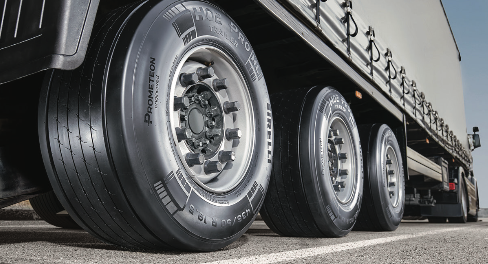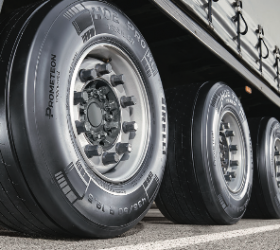As an HGV owner / operator, tyres are one of the most important components of your vehicle. Proper tyre maintenance not only helps to ensure your safety on the road, but it can also save you money on replacement costs and improve fuel efficiency.
 Here are some tyre-saving tips for HGV drivers:
Here are some tyre-saving tips for HGV drivers:
Check your tyre pressure regularly
Maintaining proper tyre pressure is crucial for tyre safety and longevity. Under inflated tyres can cause uneven wear and tear, reduce fuel efficiency, and even lead to a blowout. Overinflated tyres can cause a harsher ride and wear out faster in the centre of the tread.
Check your tyre pressure at least once a week, and before every long journey. Use a reliable tyre pressure gauge, and ensure that the pressure matches the manufacturer’s recommended levels.
Rotate your tyres regularly
Regular tyre rotation can help to even out wear and tear, prolong tyre life, and improve fuel efficiency. Tyres on the drive axle of an HGV tend to wear faster than those on the steer or trailer axles, so it’s important to rotate them every 10,000-12,000 miles.
Check your tyre tread depth
The legal minimum tyre tread depth for HGVs is 1.6mm across the central three-quarters of the tread width. However, it is recommended to replace tyres once the tread depth reaches 3mm to ensure optimal grip and safety.
Check your tyre tread depth regularly, and replace your tyres when necessary. Worn tyres can affect your vehicle’s stability and handling, especially in wet or icy conditions.
Avoid overloading your vehicle
Overloading your HGV can cause excessive wear and tear on your tyres, leading to damage and even blowouts. It can also affect your vehicle’s handling and stability, which can be dangerous on the road.
Check your vehicle’s weight limits and ensure that you are within them before every journey. Distribute your load evenly across your axles, and avoid carrying unnecessary weight.
Use the correct tyre type
Different types of tyres are designed for different applications, such as long-haul, regional, and urban driving. Using the wrong type of tyre can lead to excessive wear and tear, reduced fuel efficiency, and even affect your vehicle’s handling.
Choose the correct type of tyre for your vehicle and the conditions you will be driving in. Consult with a tyre specialist if you are unsure.
Avoid harsh braking and acceleration
Harsh braking and acceleration can cause excessive wear and tear on your tyres, leading to premature wear and replacement costs. It can also reduce fuel efficiency and affect your vehicle’s handling.
Use gentle braking and acceleration, and avoid sudden stops and starts. This can not only save on tyre costs but also improve overall safety and fuel efficiency.
Keep your wheels properly aligned
Proper wheel alignment is crucial for tyre safety and longevity. Misaligned wheels can cause uneven wear and tear, which can lead to costly replacements and reduced fuel efficiency.
Check your wheel alignment regularly, and have it adjusted if necessary. This can help to prolong tyre life and improve fuel efficiency.
In conclusion, proper tyre maintenance is essential for HGV safety, longevity, and cost savings. Regularly checking tyre pressure, tread depth, and alignment, along with rotating tyres and avoiding overloading and harsh driving, can all help to save money and improve safety and fuel efficiency.





